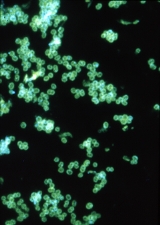
Neisseria
Overview
The Neisseria is a large genus of commensal bacteria
that colonize the mucosal surfaces of many animals. Of the 11 species that colonize humans, only two are pathogens. N. meningitidis and N. gonorrhoeae often cause asymptomatic infection
s, a commensal-like behavior. Most gonoccocal infections are asymptomatic and self-resolving, and epidemic strains of the meningococcus may be carried in >95% of a population where systemic disease
occurs at <1% prevalence.
Bacteria
Bacteria are a large domain of prokaryotic microorganisms. Typically a few micrometres in length, bacteria have a wide range of shapes, ranging from spheres to rods and spirals...
that colonize the mucosal surfaces of many animals. Of the 11 species that colonize humans, only two are pathogens. N. meningitidis and N. gonorrhoeae often cause asymptomatic infection
Infection
An infection is the colonization of a host organism by parasite species. Infecting parasites seek to use the host's resources to reproduce, often resulting in disease...
s, a commensal-like behavior. Most gonoccocal infections are asymptomatic and self-resolving, and epidemic strains of the meningococcus may be carried in >95% of a population where systemic disease
Systemic disease
Life-threatening disease redirects here.A systemic disease is one that affects a number of organs and tissues, or affects the body as a whole. Although most medical conditions will eventually involve multiple organs in advanced stage Life-threatening disease redirects here.A systemic disease is one...
occurs at <1% prevalence.

